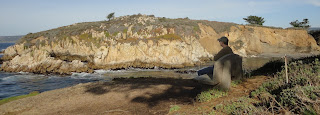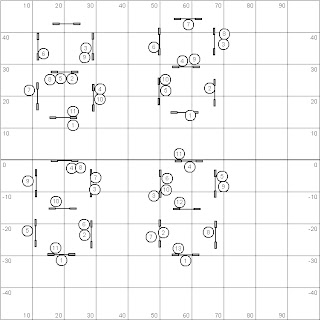Seems to be my month for seminars. This past weekend found me in Novato, California at the Marine Humane Society. I attended a 3 day lecture on Aggression. The presenter was
John Rogerson from the UK.
Imagine sitting in a small theater.
Ascending seats with little tables attached (like grammar school).
150+ women, about 5 men
one presenter (and his wife who assisted throughout)
participants were shelter workers, dog trainers, people with aggressive dogs....about what you'd expect
I spent my $$ and gave up my time to learn something that might be valuable in the future. What I came away with was a hunger to learn more and a deeper understanding of why the relationship I have with my dog is of utmost importance and an eagerness to work on that relationship.
The seminar, frustrating at times, was not boring. Day one, seminar starts at 9am. John starts talking at 8:45. He continued talking until 12:15 and then said we'd break for lunch. He was back in the theater at 12:45 talking again (some people hadn't even gotten to the food yet). Seminar ends at 4, he stopped talking at 4:30. John has something to say and wants to get as much in as possible. No breaks. Does the man get tired?
John's style is to communicate with stories. I have to say the time flew by. I was so surprised at how quickly time passed and by day three started to feel the same way John did - we just didn't have enough time to talk about everything.
There was no video or demo. I believe the video would have helped me understand some of his techniques, but I can see that it would have slowed the flow of information.
Some highlights (all of this is his opinion and he is quick to note that not all agree with him and it is up to us to do our research to find what works best for us...this is his experience and not everyone will agree):
Building the relationship you have with your dog is the most important thing. This must be done on a one on one basis and the dog must learn to love and live with humans. (E.g., getting a dog to play with your other dog is not building a relationship with your dog).
The dog MUST learn to play with toys. This is part of the relationship building and is vital.
Using emotion to train your dog is vital. Balance is the key. In moving to food (clicker) we have moved away from using emotion. Emotion is an important tool in your tool box.
Cause no harm. There are ways to do things without causing harm. He uses martingales or buckle collars, food in some circumstances (surprise!), an element of fun, however, a seriousness about safety is utmost.
Johns style is to have a good time. He uses humor and surprise to keep the audience waiting for the next tidbit of information. He doesn't always give the answers right away. He is trying to get us to think. On his thinking, well, he tends to looks at the solution rather than the problem. (e.g., problem, my dog is pulling on the leash and lunging at dogs...solution: teach your dog to walk on the leash nicely). He admits his mistakes but keeps trying.
For those of us used to an outline, course notes, handouts, and schedule, John's style could be confusing and frustrating. I have to admit, I'm one that falls into the box of I want to know what to expect when. I expected to talk about a subject, finish the subject, and then move on. Every time John said, "Oh, yes, well, I'll talk about that tomorrow," I would want to yell, "FINISH THE TOPIC WILL YOU!!" But by the end of the three days, I was floating along the spiderweb of information like a pro.
Overall I am incredibly happy that I attended the seminar. John has given me the tools of discovery and exploration. He has presented a good case for looking at the solutions, rather than the problems.

















































